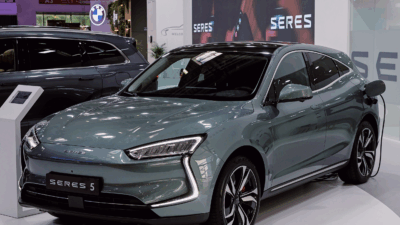EV Makers Worry About Tax Credits in a Second Trump Term
If Biden loses, the tax credits from the 2022 Inflation Reduction Act may get wiped out, hampering future sales.
Sign up for smart news, insights, and analysis on the biggest financial stories of the day.
Another potential roadblock faces EV makers.
Carmakers like General Motors and Nissan are concerned that if Donald Trump returns to office in 2025 his plans to reshape US policy and scrap Inflation Reduction Act tax credits could spell doom for EV sales, the Financial Times reported.
Gimme a Tax Break
The federal law, enacted in 2022, offers up to $7,500 in tax credits on EVs made in North America and built using parts locally sourced or from trade partners. The Biden administration uses the tax breaks as a way to further its environmental goals while also trying to get an edge over Chinese EV manufacturers.
But not everyone’s a fan of the nearly $800 billion spending that came with the new law. Last September, Trump bashed President Joe Biden’s proposed de facto mandate that two-thirds of all new cars sold in the US be electric by 2032, calling it an “assassination” of the auto industry. Two months later, Trump’s senior campaign advisers told the FT that the ex-president planned to overhaul US policy during a second term.
So the auto industry’s long-term plans could fall into disarray if the US swaps the person sitting in the White House this time next year:
- GM CFO Paul Jacboson told the FT the inflation law has been a “tremendous benefit” to the EV market, saying he’d hate to see it go away and raise the risk that EVs are no longer viable.
- Nissan CEO Makoto Uchida didn’t comment on the politics, but has previously said the world needs to shift away from combustion engines and that “penetration of EVs will be much more promising” under the inflation reduction law.
Good, But Not Great: Plans by various car makers to go fully electric in the next decade or so have been tempered in the face of slowing demand. EV sales accounted for 9% of US market share in 2023 — it’s a record, but not quite what auto companies were hoping for. Prices still average above $50,000 — gas-powered cars are closer to $30,000 — and many drivers haven’t gotten on board with the charging-station logistics. EVs could be the cars of the future, but most drivers are living in the present.












